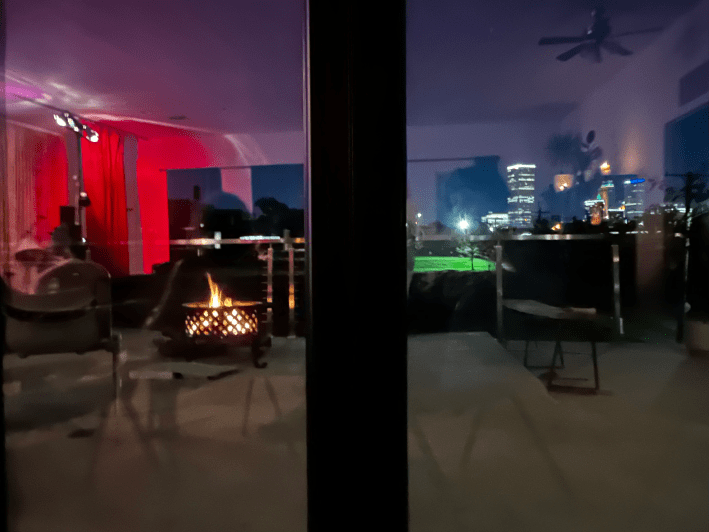White Boy Scream / Kole Galbraith & Warren Realrider / Castigada
Drifters Theater
July 9, 2025
Greasers and socs have been rumbling around in the mythology of Tulsa for a long time, but there’s another undersung character who’s just as much a part of it: the drifter, the Motorcycle Boy, the itinerant preacher, the rambler who makes his way now and then to Tulsa Time, taking in a sunset and a honkytonk beer before moving on down the road.
It took Dylan Aycock a while to come up with a name for the project he’s been working on for the past several years, but Drifters Theater is just right. In February 2022, he bought the old Owen Park Baptist Church, which sits atop a steep hill west of downtown, across from the Tulsa School of Arts and Sciences, overlooking the skyline. He lives in the adjacent parsonage house, from which, inch by inch, he’s been remodeling the church into a venue that feels perfectly tuned to this moment when so many Tulsa “drifts”—cultures, artistic disciplines, creative communities—are meeting and merging in new ways. Think of it as a one-man, small-scale, extra-gritty, super-DIY version of the Pony Coffee rebuild. It seems to have come right up out of the heart of the original space, evolving its vintage warmth into a spot where today’s Tulsa can stop and breathe.
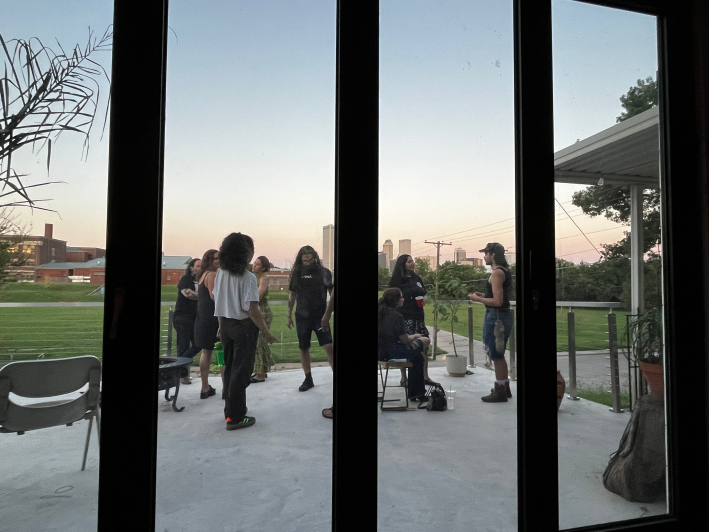
One of Tulsa’s most gifted instrumentalists, Aycock is someone who takes his time, who usually works out of the spotlight, who’s willing to sit with something for the long haul. His Scissor Tail Records, founded in 2010, has put dozens of beautiful, handmade editions into the world: a tribute to legendary guitarist Bruce Langhorne, the slam-dunk debut record by New Zealand’s Nadia Reid, early work by Hayden Pedigo, strong albums by Tobacco City, and a scattering of releases by Aycock himself and his brother Jesse, among many others.
Drifters Theater is marked by the same easygoing but intentional focus. To the existing church building Aycock has added a sweet patio, red velvet stage curtains, a solid sound system, lighting, and big glass windows that can open wide when the weather’s nice. But he’s kept the pleasantly creaky dark wood church pews, and the baptismal zone still stands behind where I imagine an altar once was, backed by a huge photo of a tree-lined creek with a bridge across it. Above a shelf spread with tea lights, a little plexiglass half-window pokes up, hand-painted with fronds of green grass.
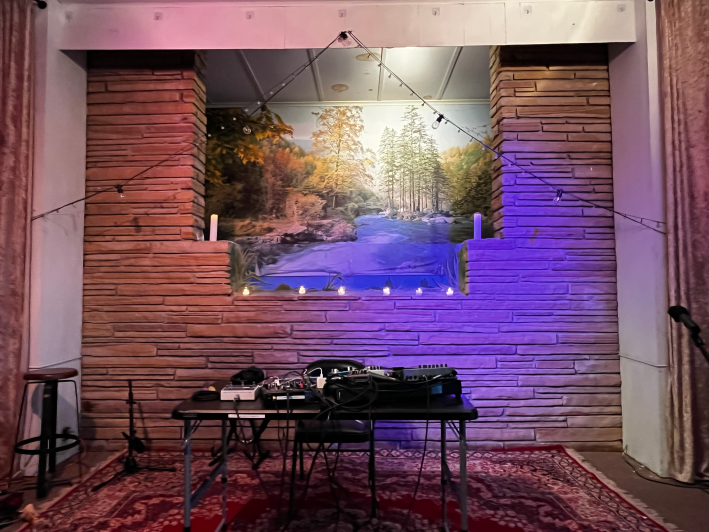
The space feels like what it is: a spot that’s been lived in, sung in, prayed in, potluck-suppered in, a place to land for a few hours on life’s lonesome highway, listening and talking and watching the sun go down. That’s exactly what I did last week, leaving the striving city behind for the kind of Tulsa experience I’m craving more and more: a quality noise show in an old Baptist church with a fire pit outside, friendly people, a bookcase full of LPs, homey plants, water in gallon jugs at the entrance, and beers that arrived halfway through to supplement the BYO-whatever folks had showed up with, all for a $10 suggested donation.
Standing at a card table with a bobblehead puppy (tongue out) on its corner, wearing teal fingerless gloves whose color popped against the limestone behind her, the night’s first performer seemed to have channeled this whole vibe and then some into her set before she even started. Castigada is a sound project by artist Zuany Perez, also known as Swan Shekinaa, whose fashion designs have made waves with the Oklahoma Fashion Alliance in recent years. Her set was a weaving of many voices, some from childhood, some from eternity, some analog, some industrial; the mix, though gentle, resisted easy resolution. Slow, old songs in Spanish ran like a muddy river bottom under a current of rushing static. Within an ebb-and-flow of recorded water, the sound of a carousel spangled through.
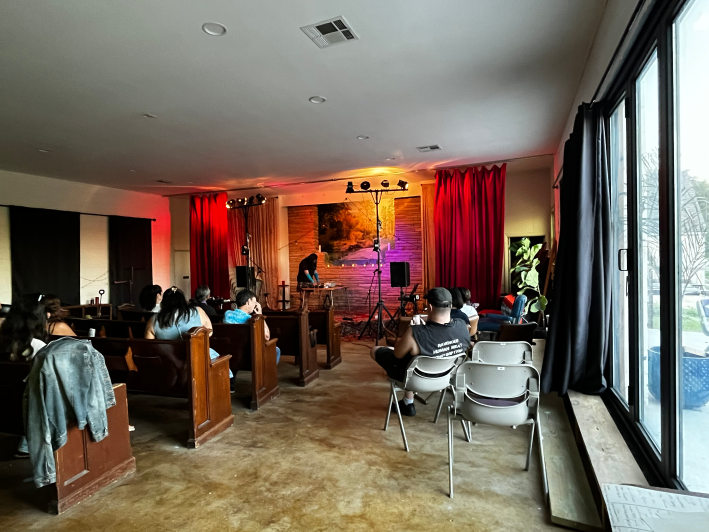
The powerful voice of White Boy Scream—a sound project of Tulsa Artist Fellow Micaela Tobin—set up a deep vibration in the night’s second set. Stomps and shouts threaded through vocal loops, warps of noise, and dialogue, creating an almost tangible soundscape; I felt like I was walking through a half-abandoned city at night. At one point, Tobin played a recording of a small church choir working out “God So Loved The World” with an out-of-tune piano—a haunting and tender inclusion in this particular setting. Her brilliantly composed 15 minutes also saw her singing with a contact mic inside her mouth and building a raucous, clanging percussive episode that had the audience sitting way forward in our pews.
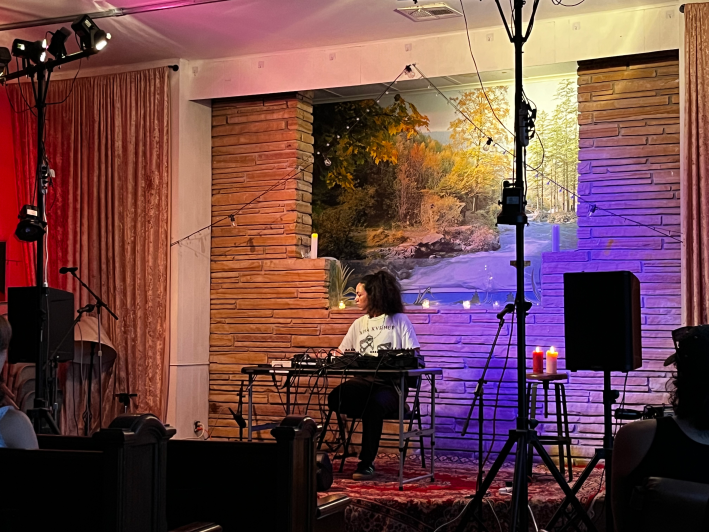
I never know how fellow TAF fellow Warren Realrider is doing what he’s doing in his noise sets—holding a little box above the table and turning it slightly, head down, plugging in cables and turning knobs—but the journey of his music is one I’m always grateful to take. In this night’s set he played with Kole Galbraith, a wide-ranging sound artist originally from Washington. Both are Indigenous, with deep interest in connecting with the sounds of the land. Over nearly 30 minutes they took us inside a world that scraped and roared, buzzed and shattered, moaned and pulsed. Their tiny movements on the sound boards created a noise like dark matter or prairie soil must always be making, if we could hear it. In this landscape, everything’s changing all the time, and it never really ends.
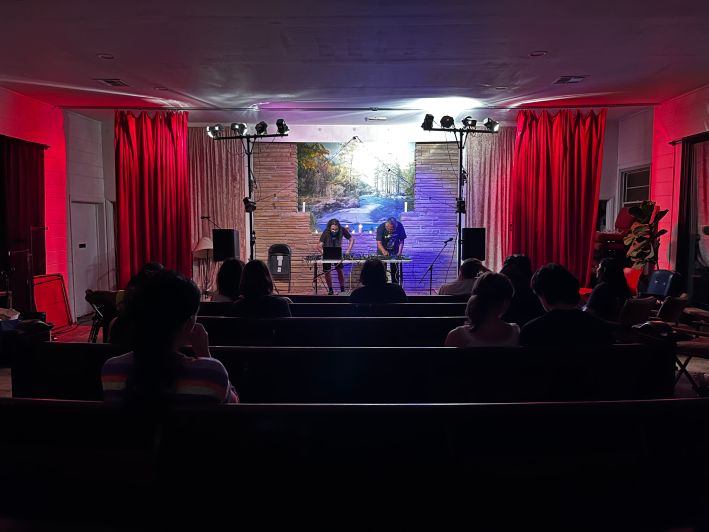
As the night wound down, the fire died low out on the patio, candles burned bright inside and skyscrapers’ lights shimmered to the east. Suddenly Galbraith and Realrider took their hands off the machinery; the silence became as much a noise as the sound had been, and we all laughed as someone at the back of the room quietly said “Fuck it up!” through the applause. Between sets, folks had gathered on the patio to talk and smoke and sweat. Some stayed out there as the music went on, listening through the windows, adding their voices to the West Tulsa song. I wandered home late, happy to have been blitzed by sound among friends on a Wednesday night, happy to know there’s a new, old place to land for whoever might be drifting through the city with tunes or jokes or stories to tell.
